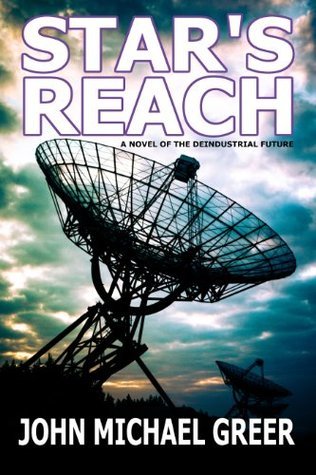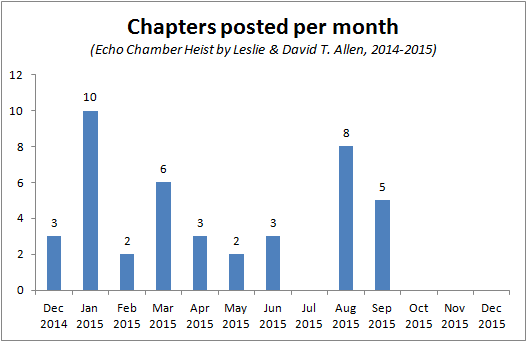Star’s Reach by John Michael Greer
 December 16, 2015
by
Leslie Anderson
December 16, 2015
by
Leslie Anderson
Star’s Reach is a post apocalyptic book that follows Trey, a ruinman who scraps pre-war buildings as he searches for, essentially, the Lost City of Atlantis of his time. Along this journey he accrues a number of friends and followers, sees countless cities, and discovers some of the biggest questions of his age, though whether or not he can find answers hangs over him throughout the book.

I would normally write a review about how engaging the plot was, or how much I loved the characters, but Star’s Reach isn’t that sort of book. You know what to expect from page twenty, in terms of plot; there aren’t any twists and turns, just unanswered questions. And while two of the characters on this journey with Trey are “special” in that they’re very different from what you or I would expect, what they are matters far more than who they are deep down.
That makes this a milieu book. I normally don’t like milieu books. What’s more, I rarely enjoy a book with a narrator, and this story is told in journal articles written by Trey after they reach their destination. Despite two writing styles that I don’t normally dig, I breezed right through this book. But why? I’ve been mulling this over for a few weeks at this point, and I think I now know.
Trey, while a likeable, believable, and realistic fellow, is rather bland. I actually think this works perfectly with him being a narrator. Part of the reason why narration so often rubs me the wrong way is that the narrator is trying too hard to be funny, or creepy, or cool, and I can’t submerge myself in the story for how self-aware the narration is. Trey just tells his story. He sometimes loops back and forth or gets off topic, but you never get the feeling that he’s worried about what his readers will think of him. It gives the story an incredibly realistic vibe, which plays into the book’s other strength:
The world is so detailed, so well thought out, so interesting and so realistic that, despite a lack of personable characters or a really deep and thought-provoking plot, I was endlessly curious about the next town, or how one story will connect to the main story. It doesn’t hurt that it has a vaguely Fallout feel to it.
This journal-like reflection has its downsides, though. There was almost no tension in the book because you know that he’ll reach his objective from, essentially, page one. That also means that there’s no reason to worry about him getting killed or maimed. He will get where he’s going, it’s just a matter of how.
Idle curiosity being the reason I kept reading did affect how I read. For example, there was an unholy compulsion that prevented me from putting down The Library at Mount Char. I’d read Star’s Reach for an hour, put it down and do something else, pick it back up a few hours later and read another ten pages, then call it quits for the day. Other times I’d be in the middle of reading a paragraph only to find my mind wandering, so I’d call it quits. I always knew that I’d pick the book back up, though, and sure enough, upon the next read, the paragraph that I couldn’t focus on would be interesting again.
I was happy enough with this approach, until the end. I won’t spoil anything, but Trey spends some time reminiscing about what happened to him throughout the story. In any other book, it’d be a sweet, nostalgic moment for the readers. The problem was, though, that the entire book is a summary, a long trail of reminiscing. We never feel like we’re walking beside him on his journey, because to span the course of 5+ years in one book he pretty much has to tell you, as opposed to showing you, what happened.
So it was only at the end, when he reminisces about specific events that we never really got to experience ourselves, that I realized the book felt like it was missing something.
I wonder how Star’s Reach would be if, instead of a single book spanning many years, the author slowed down and allowed us to be in those moments with Trey. He overcomes so much in this book that it would be easy to turn it into two—or three—books. And if he got switched to third-person limited, then we could feel every moment of terror, or those moments where it seemed like all was lost, making the reward of Trey reaching his objective all the more satisfying and engaging for us as readers.
But at the same time, perhaps that version of this same story would be trash. There’s no way to know.
Star’s Reach is a very solid 4-star for me, which is rare. My feelings about most books, plotted out against time on a graph, would look a bit like an EKG reading. Star’s Reach, on the other hand, is a constant, and there was something comforting in that consistent, steady style.



